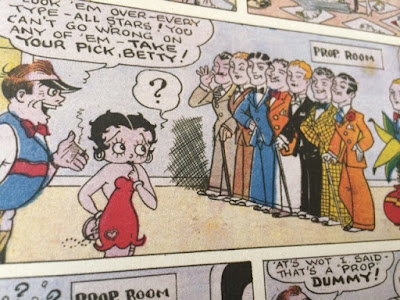
The Banana Splits Adventure Hour (1968-70), was a Saturday morning anthology series starring an animatronic rock band, with psychedelic blackouts, corny jokes, very bad songs, and cheesy cartoons. But the live-action segment, Danger Island, offered a glimpse of a 1960s gay couple.
Archaeologist Professor Hayden (Frank Aletter, who starred in It's About Time), his daughter Leslie (Ronne Troup), and their young, tanned, and remarkably toned assistant, Link (Jan-Michael Vincent, who would go on to star in Big Wednesday) are searching for a lost city in the uncharted South Seas. Suddenly pirates attack.
Link is knocked overboard, and sees the ship explode, so he assumes that his friends are dead; he therefore swims for the nearest island, fighting a shark en route. Crawling onto the shore, half-naked and half-drowned, he encounters a pair of long-time castaways.
The tall, muscular African-American Morgan (Rockne Tarkington) wears a brown vest that accentuates his biceps. His boyfriend, the short, slim Pacific Islander Chongo (professional stuntman Kahana), who is mute and somewhat addled, wears a yellow vest that looks like it was meant for a girl.
 The couple invite Link back to their cave-home, where Chongo fusses over him like a drag queen auntie, making him try on one inappropriately risqué costume after another and in the process “accidentally” fondling his hard chest and shoulders.
The couple invite Link back to their cave-home, where Chongo fusses over him like a drag queen auntie, making him try on one inappropriately risqué costume after another and in the process “accidentally” fondling his hard chest and shoulders.
 The couple invite Link back to their cave-home, where Chongo fusses over him like a drag queen auntie, making him try on one inappropriately risqué costume after another and in the process “accidentally” fondling his hard chest and shoulders.
The couple invite Link back to their cave-home, where Chongo fusses over him like a drag queen auntie, making him try on one inappropriately risqué costume after another and in the process “accidentally” fondling his hard chest and shoulders.
Link settles on skintight white pants and a blue sailor shirt (but not to worry, it’s always being torn open or ripped off). Meanwhile, Morgan advises him of the severity of their situation: Danger Island is overrun by wild animals, savages, and pirates, all with different specialties of murder and mayhem (thus its name).
Eventually Professor Hayden and Leslie, not dead after all, join the party, and they spend many cliffhangers looking for the lost city and fighting the promised wild animals, savages, and pirates (who drool enthusiastically over hardbodied Link).
In the last episode, they have thwarted every villain and acquired a boat, and they prepare to head back to civilization. But Morgan and Chongo decline rescue: “We’ve been living this way too long,” Morgan explains, his arm cozily around his partner’s waist. “We wouldn’t know how to live civilized.”
They say goodbye and walk off arm in arm. I cannot imagine what the actors thought they were portraying in this scene. I can only advise Morgan and Chongo that they could live “this way” quite happily in Greenwich Village or the Castro, with the first heady days of gay liberation immanent.

















